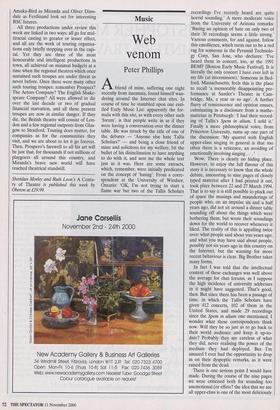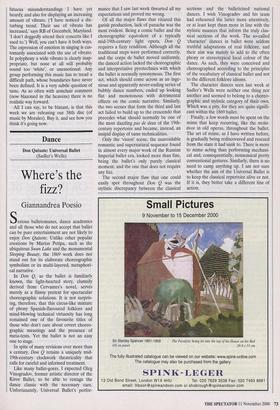Music
Web venom
Peter Phillips
Afriend of mine, suffering one night recently from insomnia, found himself wan- dering around the Internet chat sites. In course of time he stumbled upon one enti- tled Early Music List: apparently the for- mula with this site, as with every other such `forum', is that people write in as if they were having a conversation over the dinner table. He was struck by the title of one of the debates — 'Anyone else hate Tallis Scholars?' — and being a close friend of mine and solicitous for my welfare, bit the bullet of his disinclination to have anything to do with it, and sent me the whole text just as it was. Here are some extracts, which, remember, were initially predicated on the concept of 'hating': From a corre- spondent at the University of Windsor, Ontario: 'OK, I'm not trying to start a flame war but two of the Tallis Scholars recordings I've recently heard are quite horrid sounding.' A more moderate voice from the University of Arizona remarks: `Basing an opinion of hate on only two of their 30 recordings seems a little strong.' Various comments, for and against, follow this emollience, which turns out to be a red rag for someone in the Pyramid Technolo- gy Corp, San Jose, who declares: 'I've heard them in concert, too, at the 1991 BEMF [Boston Early Music Festival]. It is literally the only concert I have ever left in my life (at intermission).' Someone in Bed- ford, Massachusetts, feels this is the place to recall 'a memorably disappointing per- formance at Sander's Theater in Cam- bridge, Ma, a year or so ago'. A further flurry of reminiscence and opinion ensues, culminating in a disclosure from a mathe- matician in Pittsburgh: 'I had their record- ing of Tallis's Spem in alium. I sold it.' Finally a more philosophical voice, from Princeton University, sums up one part of the discussion: 'My quarrel with English upper-class singing in general is that too often there is a reticence, an avoiding of emotionally involving singing . . . '
Wow. There is clearly no hiding place. However, to enjoy the full flavour of this story it is necessary to know that the whole debate, amounting to nine pages of closely typed material after I had printed it out, took place between 22 and 27 March 1994. That is to say it is still possible to pluck out of space the musings and maunderings of people who, on an impulse six and a half years ago, did not sit around a dinner table sounding off about the things which were bothering them, but wrote their soundings down for the world to recover whenever it liked. The reality of this is appalling twice over: what people said about you years ago; and what you may have said about people, possibly not six years ago in this country on the Internet, but the warning for more recent behaviour is clear. Big Brother takes many forms.
In fact I was told that the intellectual content of these exchanges was well above the average for chat forums, as I suppose the high incidence of university addresses in it might have suggested. That's good, then. But since there has been a passage of time, in which the Tallis Scholars have given 412 concerts, 102 of them in the United States, and made 29 recordings since the Spem in alium one mentioned, I wonder what these correspondents think now. Will they be so just as to go back to their world audience and keep it up-to- date? Probably they are careless of what they did, never realising the power of the medium they had deployed. But I'm amazed I ever had the opportunity to drop in on their dyspeptic remarks, as it were raised from the dead.
There is one serious point I would have made. During the course of the nine pages we were criticised both for sounding too unemotional (or effete? the idea that we are all upper-class is one of the most deliciously fatuous misunderstandings I have yet heard); and also for displaying an increasing amount of vibrato. CI have noticed a dis- turbing trend. Their use of vibrato has increased,' says RB of Greenbelt, Maryland. `I don't doggedly attend their concerts like I used to.') Well, you can't have it both ways. The expression of emotion in singing is cus- tomarily associated with the use of vibrato. In polyphony a wide vibrato is clearly inap- propriate, but none at all will probably sound too 'white', or unemotional. Any group performing this music has to tread a difficult path, whose boundaries have never been defined. It is a very subtle question of taste. As so often with armchair comment (now blazoned in the heavens) there is no realistic way forward.
All I can say, to be blatant, is that this week we are releasing our 38th disc (of music by Morales). Buy it, and see how you think it's going now.



























































































 Previous page
Previous page